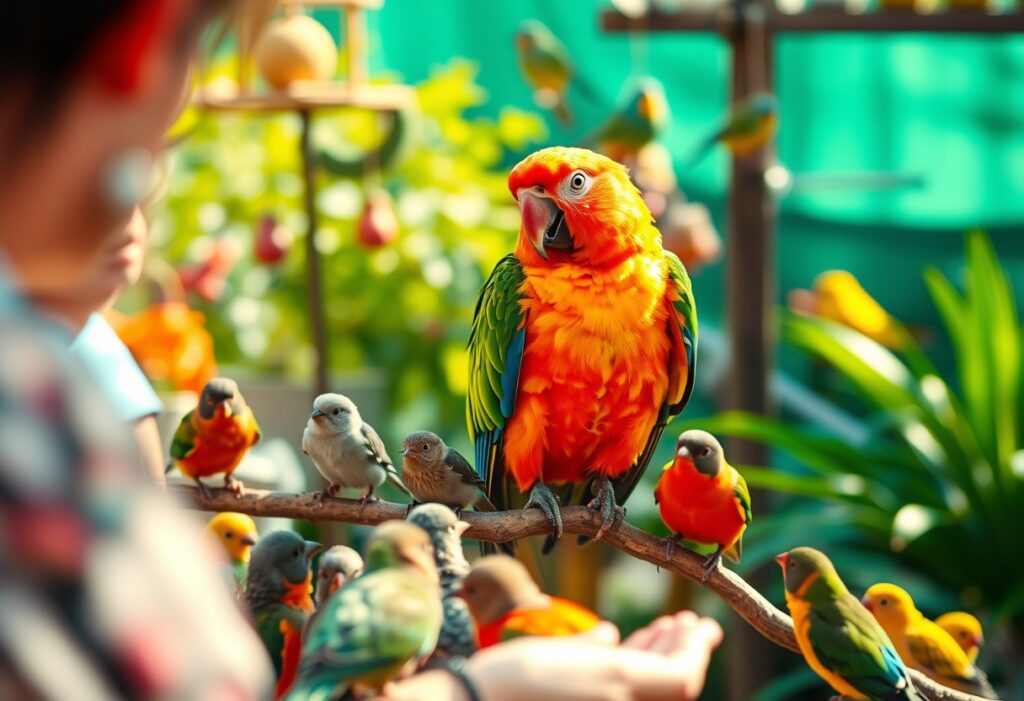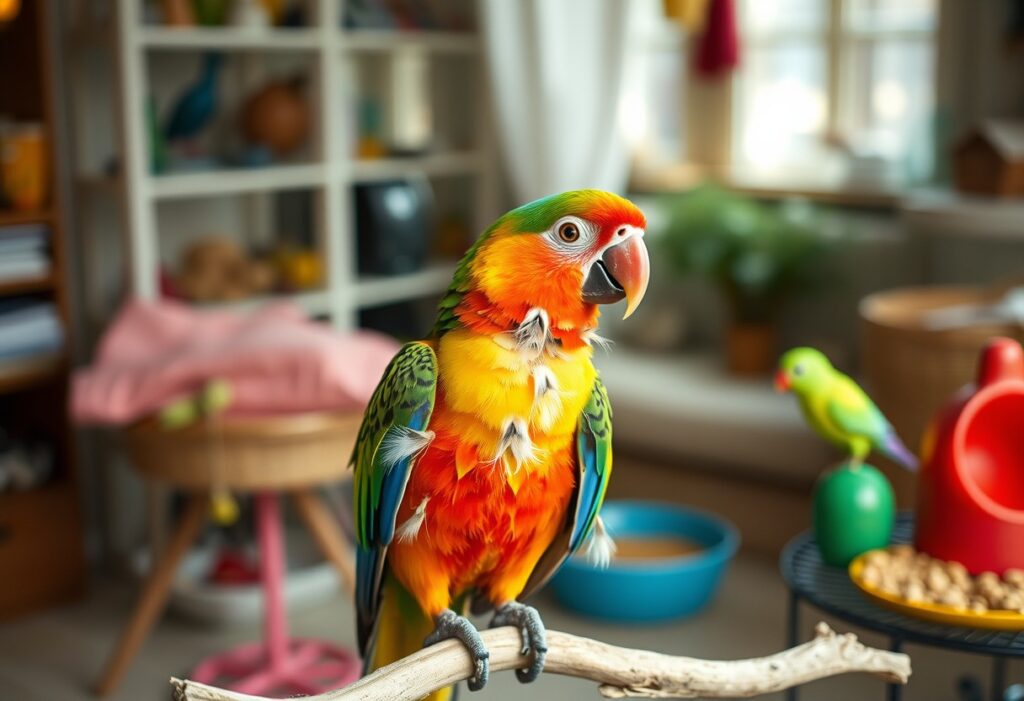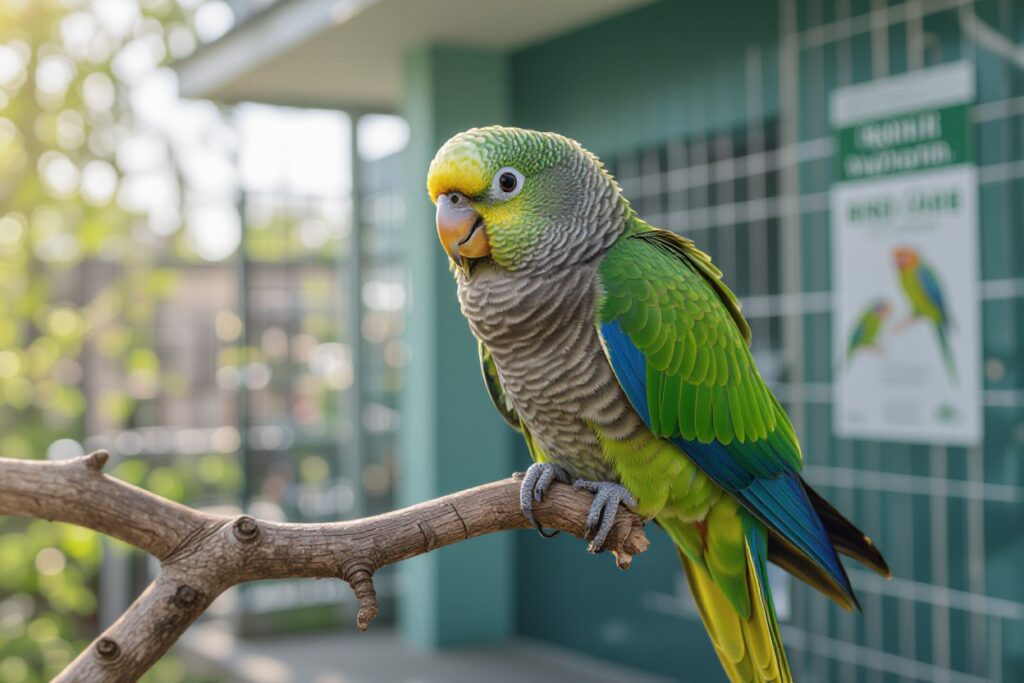Interaction with other birds, humans, and even pets can significantly enhance your feathered friend’s well-being. Socialization not only alleviates boredom but also improves your bird’s mental health, reducing the risk of negative behaviors such as feather plucking. By building strong social bonds, your bird will feel more secure and confident in its environment. Moreover, regular interaction promotes better communication skills and can even lead to a longer, happier life for your avian companion. Understanding the importance of socialization is crucial for any bird owner looking to ensure their pet thrives.
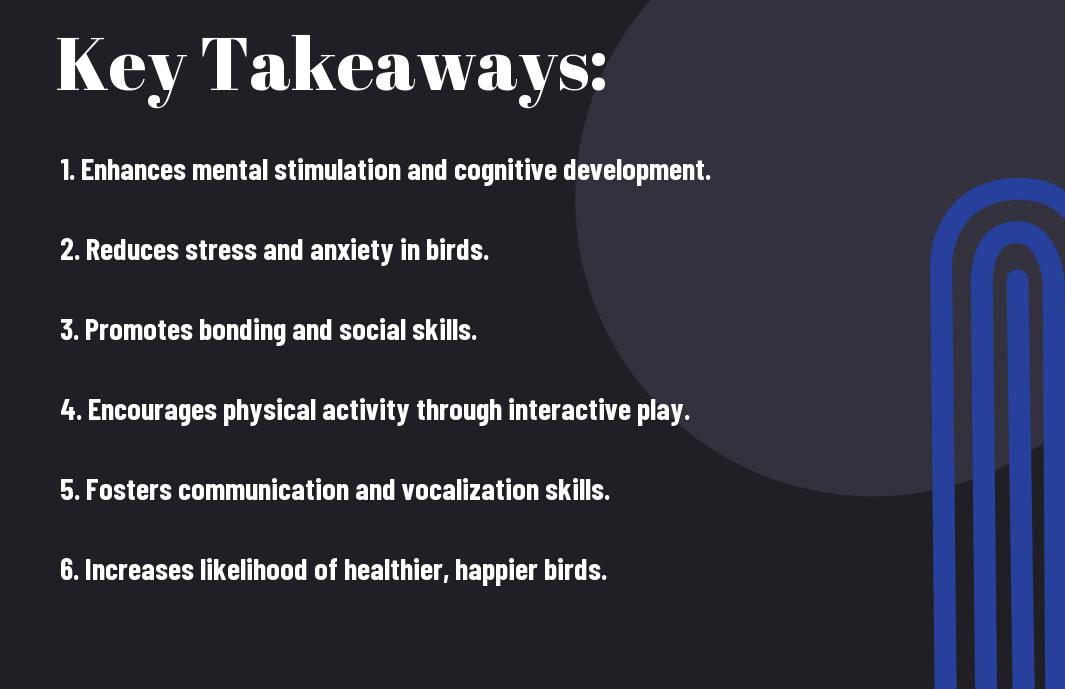
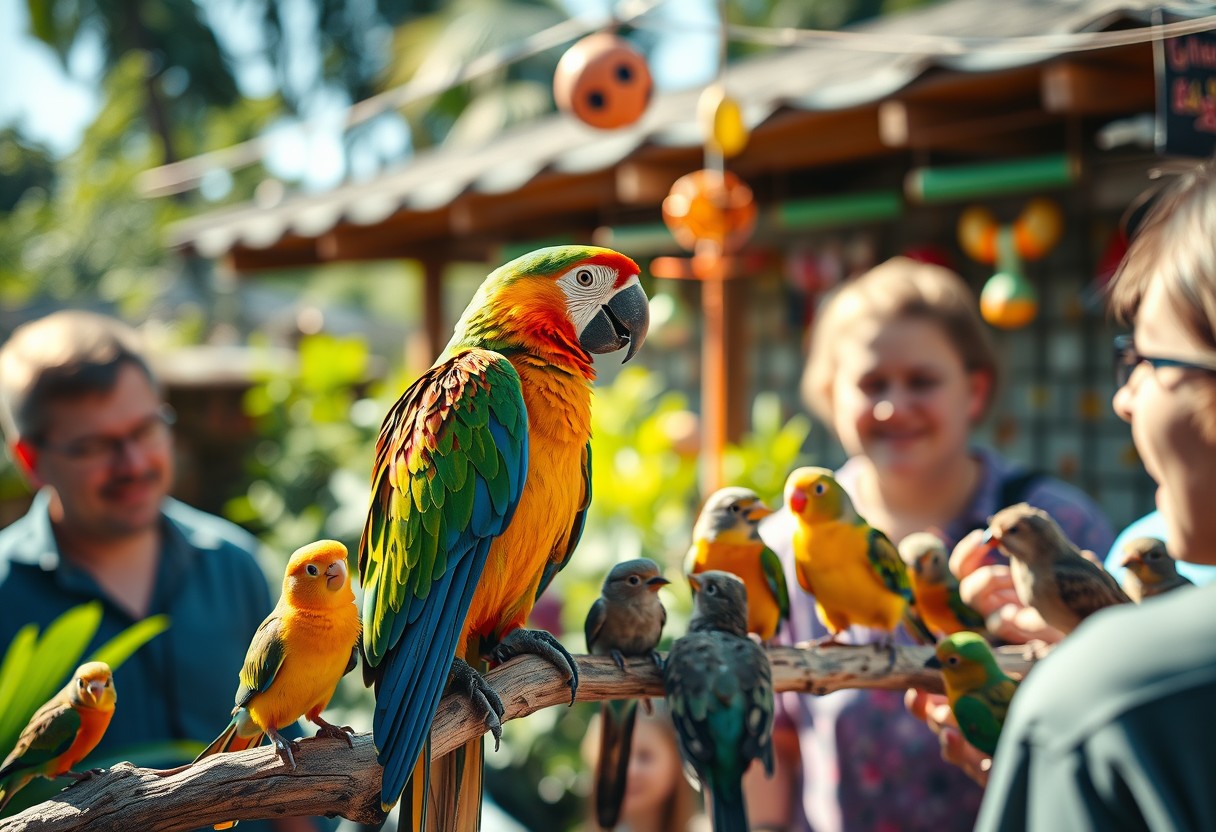
Understanding Bird Behavior
For those interested in avian companions, understanding bird behavior is necessary to fostering their well-being and happiness. Birds are incredibly social creatures, and their interaction patterns can drastically influence their health and temperament. You may need to probe deep into the instincts and habits of birds to create an enriching environment at home.
Natural Social Structures
Social structures among birds vary widely depending on the species. Many birds are naturally inclined to live in flocks, which serve as a protective measure against predators. In the wild, you might observe species such as parrots and canaries forming tight-knit communities that rely heavily on mutual support. These social structures help them find food, defend against threats, and engage in mating rituals. By understanding these natural behaviors, you can better replicate a flock-like environment in your home.
As a bird owner, it’s important to recognize that your pet may experience stress when isolated. Birds that are deprived of social interaction can exhibit signs of depression or even develop behavioral issues. Therefore, facilitating socialization—be it through interactions with other birds or spending quality time with you—can significantly improve their quality of life.
Communication Among Birds
Any bird owner will tell you that communication is a fundamental part of avian life. Birds use a range of vocalizations as well as body language to convey their feelings, intentions, and alerts to others. From loud calls that echo through the forest to subtle movements signaling relaxation or agitation, understanding these cues allows you to build a deeper connection with your feathered friend.
To effectively communicate with your bird, pay attention to their vocalizations and body language. Different sounds may indicate excitement, fear, or contentment. For example, a loud squawking might suggest your bird is feeling threatened, while a gentle chirp can indicate happiness or curiosity. Recognizing these signals not only helps you respond appropriately but also strengthens your bond and fosters a sense of security for your bird. It’s crucial to be mindful of these communication forms, as misinterpreting your bird’s needs can lead to stress and behavioral problems.
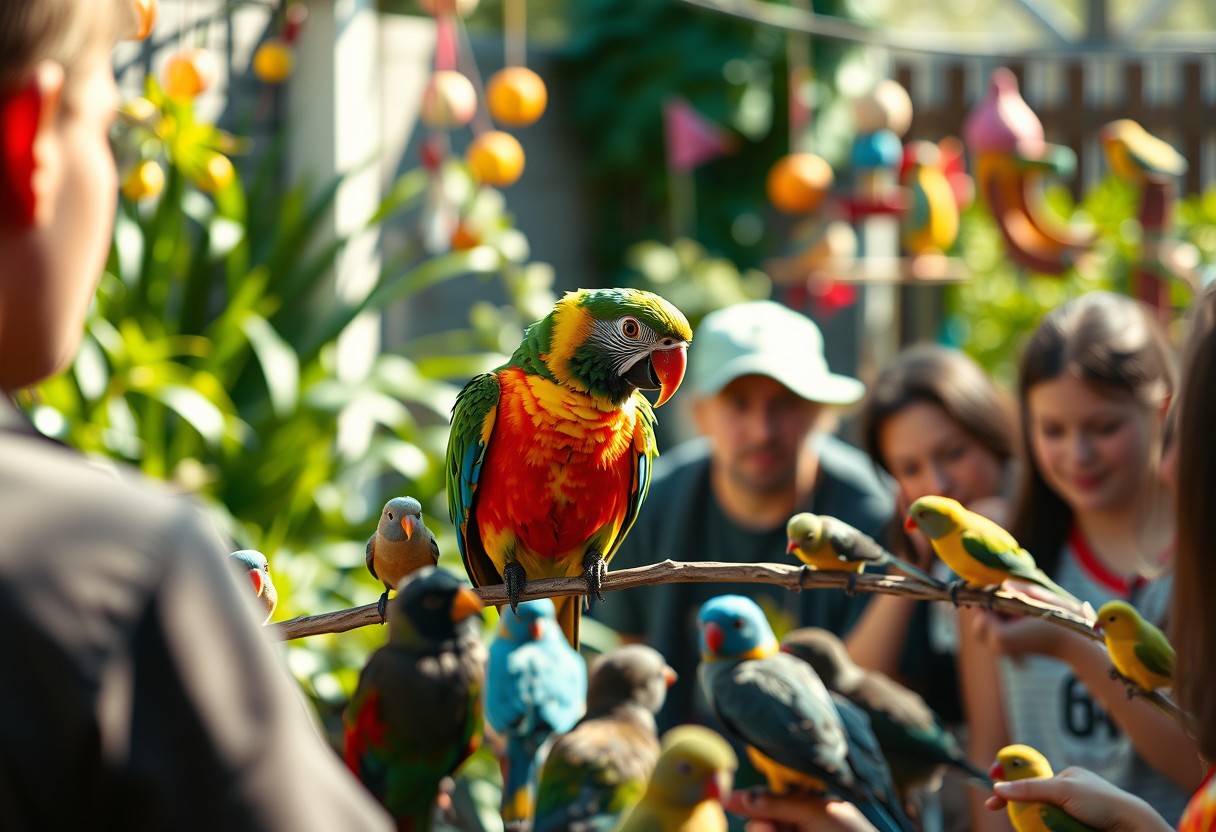
The Role of Socialization
The importance of socialization for birds cannot be overstated, as it plays a crucial role in their overall health and happiness. Birds are inherently social creatures, and their natural instincts drive them to seek the company of others, whether they are human companions or fellow avian friends. Understanding the significance of socialization can help you provide an environment that promotes well-being and fulfillment for your feathered companions.
Emotional Well-being
On a fundamental level, emotional well-being is significantly enhanced through social interactions. When you allow your bird to socialize, they experience feelings of companionship and security which can reduce the stress and anxiety that they may otherwise encounter in solitude. You’ll likely notice that a well-socialized bird exhibits a more vibrant personality, engaging in playful behaviors and vocalizations that reflect their emotional state.
On the contrary, a lack of socialization can lead to unwanted behavioral issues, such as excessive screaming, aggression, or feather plucking. By fostering a social environment, you not only combat these negative behaviors but also create a sense of security within your pet, allowing them to thrive emotionally.
Cognitive Development
The stimulation derived from socialization is important for your bird’s cognitive development. Engaging with other birds or interacting with you encourages mental exercises that are pivotal for their brain health. The more social interactions your bird receives, the more opportunities they have to learn tricks, solve problems, and develop communication skills, all of which contribute to a more enriched existence.
A well-socialized bird not only improves its learning capacity but also develops stronger bonds with its companions—both human and avian. By exposing your feathered friend to various social environments, you promote active learning and curiosity, leading to a more intelligent and adaptable pet.
Social Skills Enhancement
Emotional growth through social skills enhancement can significantly affect your bird’s interactions with both humans and fellow birds. When you take the time to socialize your pet, you help them develop vital skills such as sharing, taking turns, and understanding boundaries. These capabilities improve their ability to communicate effectively, reducing the potential for misunderstandings and conflicts.
By spending quality time engaging in social activities with your bird, you lay the foundation for a thriving relationship. This combination of social skills and emotional intelligence leads to a more harmonious existence within your household.
Wellbeing in your bird is directly linked to their ability to navigate social situations. Not only do enriched social skills create a more enjoyable life for them, but it also minimizes the risk of behavioral problems that can arise from isolation or lack of interactions. Your commitment to socialization can lead to a healthier, more balanced bird.
Benefits of Interactions
All creatures, including birds, thrive on socialization, and interactions with other birds or even human companions greatly enhance their well-being. Understanding the myriad benefits of these interactions can help you create a nurturing environment for your feathered friends. This chapter will explore how socialization reduces stress, promotes physical health, and encourages vital play and exploration.
Reducing Stress and Anxiety
One of the primary benefits of social interactions for birds is the significant reduction of stress and anxiety. Birds are naturally social animals, and when they are isolated, they often experience heightened levels of distress. Engaging regularly with other birds or humans can provide them with emotional support and help to alleviate feelings of loneliness. You may notice that your bird becomes more vocal and active when they have opportunities for social interaction, indicating that they feel safe and secure.
Moreover, socializing helps in the distraction of negative behaviors that can stem from stress, such as feather plucking or excessive screaming. When you facilitate a social environment, you can observe how your bird’s mood improves, leading to a more balanced and happy demeanor. The presence of companions can help them feel more at ease and reduce the likelihood of developing harmful habits.
Promoting Physical Health
Benefits of social interactions extend beyond psychological well-being; they also play a crucial role in promoting your bird’s overall physical health. Engaging in social activities often encourages birds to be more active, which can thoroughly boost their fitness levels. Shared playful moments, whether it’s chasing each other or simply hopping around together, can keep your bird’s muscles toned and their cardiovascular system robust.
Interactions among birds create opportunities for mimicked behavior that fosters a more physically active lifestyle. When birds see others foraging or exercising, they tend to imitate those actions, and this imitation enhances their mobility and strengthens their bodies. This is especially beneficial for younger birds, as these interactions contribute to their growth and development in a lively group setting.
Encouraging Play and Exploration
On top of the physical and emotional advantages, social interaction plays a pivotal role in encouraging your bird’s playfulness and exploration instincts. Birds that engage with their peers or human caretakers are often more inclined to try new toys and activities. This engagement leads to a diverse range of stimuli that keeps their minds sharp and agile. As a result, you’ll find that a playful bird is not only more content but also better equipped to handle various environments and experiences.
Moreover, when birds participate in group activities, they are exposed to a wide range of experiences that might otherwise remain unknown to them. This increased exposure has a profound impact on their cognitive development, as they navigate through challenges presented by their companions and learn new skills. A socially stimulated bird tends to be more adaptable, curious, and confident as they explore their surroundings.
Health and happiness go hand in hand for social birds. When you prioritize interactions, you’re ensuring that your feathered friend not only thrives physically but also emotionally and mentally. Encouraging socialization can lead to a more fulfilling life for your birds, opening the door to endless possibilities of play and exploration.
Conclusion
On the whole, socialization is a vital aspect of avian care that significantly contributes to the well-being of your birds. Engaging your feathered companions in social interactions fosters their mental and emotional health, resulting in happier and more content pets. By providing opportunities for positive social experiences, such as interaction with other birds or even human family members, you can help to reduce stress, prevent behavioral issues, and enhance your birds’ social skills. Understanding the intrinsic social nature of birds enables you to create an enriching environment that caters to their needs.
Furthermore, the benefits of socialization extend beyond just improving your birds’ happiness. Socialized birds often exhibit more robust physical health, better vocalization skills, and greater adaptability to new situations, which are necessary for their long-term welfare. As a responsible bird owner, prioritizing socialization can profoundly impact your avian companions’ quality of life. By dedicating time to facilitate these social interactions, you ensure that your birds thrive, allowing you to enjoy a deeper and more fulfilling bond with your feathered friends.
FAQ
Q: What are the main benefits of socialization for pet birds?
A: Socialization is crucial for pet birds as it helps prevent behavioral issues such as aggression or anxiety. It encourages mental stimulation, promoting cognitive development and reducing boredom. Interacting with humans and other birds allows them to develop social skills, leading to a healthier and happier life. Moreover, socialized birds tend to be more comfortable during vet visits and other stressful situations.
Q: How can I effectively socialize my bird at home?
A: Start by creating a safe and calm environment for your bird. Spend time daily talking to, handling, and offering treats. Gradually increase the duration of interactions and introduce toys that require play together. You may also consider scheduling playdates with other birds, ensuring that the other bird is friendly to encourage positive social experiences. Always observe your bird’s comfort level and progress at their pace.
Q: What signs indicate that my bird needs more socialization?
A: Signs that your bird may need more socialization include excessive squawking, feather plucking, or aggression. If your bird frequently hides or becomes distressed when approached, it may indicate a lack of comfort and social interaction. Additionally, a bird that shows disinterest in play or appears lethargic may benefit from more engagement with its environment and social interactions. Improving their socialization can significantly enhance their overall well-being.
